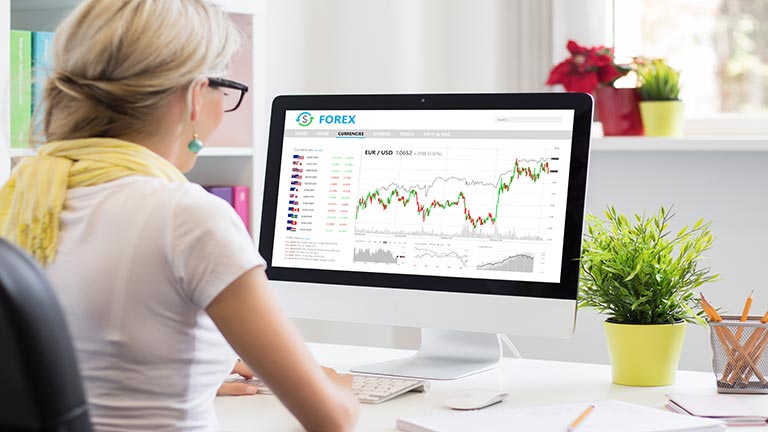How to Make Serious Money Trading Financial Markets

By Dale Gillham
The overriding emotions that govern how individuals make decisions when trading financial markets is fear and greed. But if you want to know how to make serious money when trading these markets, you need to learn how to properly invest rather than relying on the advice of brokers and financial advisers.
Making rational decisions when trading financial markets
All too often I have seen investors and advisers fail to make rational decisions about investing in financial markets, only to rely on the old cliché that it’s time in the stock market that counts. It’s common to hear people say I haven’t lost because I haven’t sold or it’s a good stock and it will come back to where it was before. But clichés like these are simply an excuse for a lack of education.
Decisions based on fear stem from the concern of not wanting to lose money, while decisions based on greed result from a desire to make money now. And in volatile financial markets, these emotions can be amplified, particularly when the investor lacks the required knowledge and understanding to manage their investments.
Historically, it has been proven that people with the right education are more successful and achieve better returns when trading financial markets than those with little or no knowledge because as the saying goes, wealth is the transfer of money from the uneducated to the educated. Although from experience, I believe it would be better put: Wealth is the transfer of money from the misinformed to the informed.
Given this, you would have to agree that it’s wise to gain a solid education when it comes to trading financial markets, so that you are prepared to manage your psychology and your investments in any market condition.
Seeking professional advice
While seeking professional advice may seem like a wise choice, many people are lulled into a false sense of security when it comes to dealing with brokers and advisers. That’s because they believe they are dealing with someone who has more wisdom and knowledge than they possess on their own.
In the majority of cases, however, these professionals are paid a fee to sell product, and the education they receive is usually provided or paid for by the institutions with which you invest. This often means that the educational value provided by your adviser is limited to towing the company product line, rather than giving the investor independent advice.
Don’t get me wrong, advisers do have a role to play, so I am not suggesting that you shouldn’t seek professional advice when it comes to investing in financial markets. But if you do, I always recommend you question the advice and under no circumstances should you rely on only one person for this advice.
Educate yourself about financial markets
While many investors are willing to spend valuable time listening to their adviser to determine the next best investment, when it comes to educating themselves about financial markets, they never quite seem to find the time or the money. They prefer to do what seems urgent rather than what is important, and in doing so divorce their responsibility to someone else only to blame them if it doesn’t work out.
But if it is your desire is to take control of your investments, then the best option is to get a solid education from a reputable company that specialises in share trading education. This way you are equipped with the knowledge and understanding to make educated decisions about your future when trading financial markets.
It is also common for people with little or no experience to give their money to advisers who also have little or no experience other than to recommend product. All too often, this results in the adviser getting paid handsomely while the client has to suffice with average returns. But this really doesn’t sound like a recipe for success if you ask me.
So the question you have to ask yourself is this: Would you give your money to someone who may not be any more educated about investing than you?
Investing your hard-earned money in financial markets

While there are a number of good advisers who recognise that financial advice is more than just recommending product, on the whole they are governed by an approved product list, which means there is a lack of flexibility and impartiality when it comes to supporting you and your investments.
Given this, if you do decide to invest your hard earned money with an adviser, make sure they have a track record of delivering solid returns over a period of least four to five years.
That’s because it is a well-known fact that financial markets have lows every four to five years that are generally in the order of 20 per cent, and approximately every 20 years, we have a crash in the order of 50 per cent like we experienced during the Global Financial Crisis. Investors and traders who understand this know how to avoid these market downturns and/or profit from them.
They also understand that investing is all about managing investment risk, and it is the investor’s ability to manage this risk that ensures they increase the profits they take from the market. But this brings up another challenge.
The amount we invest tends to change our perception of risk
The amount an investor has to invest tends to change their perception of the risk they are taking and the research, and education required to manage that risk. Usually this is because it is much easier to swallow a $1,000 mistake than a $500,000 mistake. Let’s face it, people spend far more time determining which property to buy than they do deciding which stocks to buy.
But the process taken to invest $500,000 or $1,000 should be exactly the same, as they both represent the same amount of risk. Given this, irrespective of the amount of money you have to invest, you should always take the same amount of time researching your options to ensure you are protecting your capital on each and every occasion.
Remember, the process taken to select and manage a portfolio of shares is the same regardless of the size of the investment. You also need to remember that no one is infallible; therefore, when investing in financial markets you need to expect that you will lose sometimes, and in these instance you need to have an exit strategy in place, such as a stop loss to protect your capital.
Managing the emotions of fear and greed
Over any ten-year period, you need to accept that there will be times when your investments will not perform, no matter what they are. While at other times, they will do very well and you will start to think that the good times will last forever. It is during these times that you need to know how to manage the emotions of fear and greed when trading financial markets, as they often lead you to make many mistakes, which can otherwise be avoided with the right skills and knowledge.
Given this, education is extremely important for any type of investor as a good education will ensure you make the right decisions about your investments. That said, I believe it’s even more important for the smaller investor as they cannot afford to lose. In fact, people will often wait until they have more money before they decide to educate themselves, while the wise educate themselves first so they have the knowledge to be able to make serious money. Remember, big investors were once small investors, so the earlier you educate yourself the better.
Others who read this also enjoyed reading:






